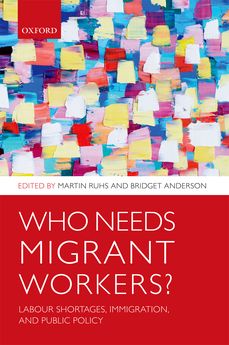Are migrant workers needed to 'do the jobs that locals will not do' or are they simply a more exploitable labour force? Do they have a better 'work ethic' or are they less able to complain? Is migrant labour the solution to 'skills shortages' or actually part of the problem? This book provides a comprehensive framework for analysing the demand for migrant workers in high-income countries. It demonstrates how a wide range of government policies, often unrelated to migration, contribute to creating a growing demand for migrant labour. This demand can persist even during economic downturns. The book includes quantitative and qualitative analyses of the changing
role of migrants in the UK economy. The empirical chapters include in-depth examinations of the nature of staff shortages and the use of migrant workers in six sectors: health; social care; hospitality; food production; construction; and financial services.
The book's conceptual framework and empirical findings are of importance to academic and policy debates about labour immigration in all high-income countries. The final chapter presents a comparative analysis of research and policy approaches to assessing labour shortages in the UK and the US. It examines the potential lessons of the UK's Migration Advisory Committee (MAC) for current debates about labour shortages and immigration reform in the US. The book will be of significant interest to policy-makers, stakeholders, academics and students.
Features
- Contributions and analysis from experts who have advised the UK's Migration Advisory Committee (MAC) on the nature and determinants of staff shortages and immigration policy
- Highlights how demand for migrant workers can be linked to wider policies and economic/social systems that are heavily influenced by the state, and are outside the direct control of employers and workers
- Helps the reader identify the key conceptual issues and questions in the debate about shortages and immigration policy
- Includes quantitative and qualitative approaches within a unified conceptual framework
- Includes commentaries on main chapters provided by leading academics
- Immigration remains a hot topic in the UK. The Government has made many changes to the UK's labour immigration policies. Public consultations are underway that receive very large numbers of submissions (the government's consultation on the cap on labour immigration had more than 30,000 submissions).
1Introduction
2Migrant workers: who needs them? A framework for the analysis of shortages, immigration, and public policy
Commentary by Ken Mayhew
3The changing shares of migrant labour in different sectors and occupation in the UK economy: An overview
4Achieving a self-sufficient workforce? The utilization of migrant labour in healthcare
Commentary by Robert Elliott
5Competing with myths: migrant labour in social care
Commentary by Alessio Cangiano
6The use of migrant labour in the hospitality sector: current and future implications
Commentary by Linda McDowell
7UK food businesses' reliance on low-wage migrant labour: A case of choice or constraint?
Commentary by Ben Rogaly
8The dynamics of migrant employment in construction: Can supply of skilled labour ever match demand?
Commentary by Howard Gospel
9Immigration and the UK labour market in financial services: A case of conflicting policy challenges?
Commentary by Jonathan Beaverstock
10A need for migrant labour? UK-US comparisons
Academics and researchers interested in labour economics, immigration, sociology, public policy, and human geography. Policy-makers in the UK, US, Canada, Australia, and Europe. The general reader with an interest in immigration, public policy, and employment and economic issues in specific sectors.
